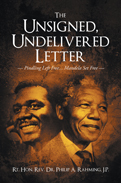
 |
The Unsigned, Undelivered Letter: Pindling Left Free...Mandela Set Free
by Rt. Hon. Rev. Dr. Philip A. Rahming, J.P.
Westwood Books Publishing
Faith, love, and loyalty, both in God and the Bahamas, are at the core of Rahming's text. An iconic figure in his own right, the author is credited for writing the lyrics to the Bahamian National Pledge of Allegiance as well as the national song, "God Bless our Sunny Clime." In this nonfiction work, however, Rahming explores an aspect of Bahamian history that could have served as a tipping point during the nation's infancy. When members of the Bahamas Christian Council (BCC), an organization that held sway, sought to remove Sir Lynden Pindling, they drafted a letter and designated Rahming, president of the council, as the man to deliver it to the prime minister himself. The unimaginable pressure and burden of such a responsibility were not lost on the author. The trickle-down effect of either delivering the letter or not delivering it made for a lose-lose situation.
More than anything else, Rahming's work reads as a fluid reflection of two larger-than-life men—both he and Sir Lynden Pindling—and the steps they took to strengthen an entire nation. While it is a seemingly impartial glimpse into the nation's historical past, it is also a foray into a future centered around service and tourism, a passing of the torch to future generations to help ignite the same love and loyalty for their Bahamian nation.
Transporting readers to the 1985 Commonwealth Heads of Government Meeting (CHOGM) in Nassau, where the focal point was apartheid in South Africa and freeing Nelson Mandela, Rahming demonstrates the devastating consequences the letter could have had on Sir Pindling's character and reputation as the host of the historic event. Over time, the author's internal battles concerning the fate of the letter spilled into the public eye. Nevertheless, he remained resolute in his conviction that even though the public might have become aware of such a letter, it should not have been delivered to the "Father of the Nation" unless the nation wished to lose a strong leader and an honorable man at the behest of a few bad actors.
Though cracks existed internally, Rahming depicts the Bahamas as a unified front for figures such as Queen Elizabeth II. The image is conjured up of a nation heavily reliant on tourism revenue whose inner turmoil would have exposed its darker underbelly of the drug trade. As a fledgling nation, such discord could have ruined the Bahamas. Whether it was the rally cries looking to oust the author or pressure from his own council members—with one even requesting a copy of the signed letter—Rahming remained unfazed. With Sir Lynden Pindling's role in establishing majority rule in the Bahamas, it is immensely clear that both the prime minister and Rahming were on a mission to uplift a group of people, a society, to where they deserved to be.
Interestingly, Rahming's knack for storytelling is as undeniable as the contributions he has made for the Bahamas. Despite diving into many dense topics such as the establishment of the Progressive Liberal Party, he never loses sight of the flow and fluidity of the narrative for the sake of providing more information. For a man who fended off typhoid as a child during a time when it was considered near-fatal, his emerging from unconsciousness repeating the twenty-third psalm perfectly captures his driving force: faith in God, no matter how dire the circumstances. Overall, Rahming's work is insightful and entertaining, a meaningful understanding of the anatomy of a nation and how one letter could have changed it all.
RECOMMENDED by the US Review